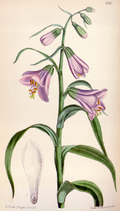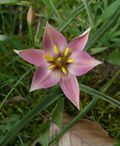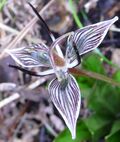Biology:List of Liliaceae genera
From HandWiki
Short description: none
The List of Liliaceae genera has been much reduced by modern molecular phylogenetic based taxonomy. The current taxonomy of Liliaceae treats the family Liliaceae as having three subfamilies, with the Liliodeae being further subdivided into two tribes, the Medeoleae and Lilieae. The family Liliaceae consists of fifteen genera and approximately 600 species in all.
List of genera by subfamilial divisions
| Subfamily | Tribe | Genus | Image |
|---|---|---|---|
| Lilioideae Eaton | Medeoleae Benth. (synonyms: Medeolaceae Takht., Medeoloideae Benth.) | Clintonia Raf. - bead lilies |  |
| Medeola Gronov. ex L. - Indian cucumber-root |  | ||
| Lilieae s.l. Ritgen (synonyms: Erythroniaceae Martinov, Fritillariaceae Salisb., Liriaceae Borkh., Tulipaceae Borkh.) (Some classifications place Tulipa and Erythronium into a separate tribe: Tulipeae with the remaining genera in Lilieae s.s.)[2] |
Cardiocrinum (Endl.) Lindl. - giant lilies |  | |
| Fritillaria Tourn. ex L. – fritillary or mission bells | |||
| Gagea Salisb. (including Lloydia Salisb. ex Rchb.) – yellow star-of-Bethlehem |
 | ||
| Lilium Tourn. ex L. – lily |  | ||
| Nomocharis Franch. |  | ||
| Notholirion Wall. ex Boiss. |  | ||
| Tulipa L. (including Amana Honda) – tulip |  | ||
| Erythronium L. – trout lily |  | ||
| Calochortoideae Dumort. (synonyms: Calochortaceae Dumort., Compsoaceae Horan., nom. illeg., Tricyrtidaceae Takht., nom. cons.) | Calochortus Pursh - mariposa, globe lilies |  | |
| Tricyrtis Wall. – toad lily |  | ||
| Streptopoideae (synonym: Scoliopaceae Takht.) | Prosartes D.Don – drops of gold |  | |
| Scoliopus Torr. – Fetid Adder's Tongue |  | ||
| Streptopus Michx. – twistedstalk |  | ||
| The situation with respect to Calochortoideae remains uncertain. Originally Calochortus and Tricyrtis were considered to be sister clades and placed together in subfamily Calochortoideae. Further study has not confirmed this and it has been proposed that Tricyrtis be placed in a separate subfamily.[3] | |||
References
Bibliography
- Stevens, P.F. (2015), Angiosperm Phylogeny Website, Missouri Botanical Garden, http://www.mobot.org/mobot/research/APWeb/, retrieved 13 April 2015
- Peruzzi, L.; Leitch, I.J.; Caparelli, K.F. (2009). "Chromosome diversity and evolution in Liliaceae". Annals of Botany 103 (3): 459–475. doi:10.1093/aob/mcn230. PMID 19033282.
- Kim, Jung Sung; Hong, Jeong-Ki; Chase, Mark W.; Fay, Michael F.; Kim, Joo-Hwan (May 2013). "Familial relationships of the monocot order Liliales based on a molecular phylogenetic analysis using four plastid loci: matK, rbcL, atpB and atpF-H". Botanical Journal of the Linnean Society 172 (1): 5–21. doi:10.1111/boj.12039. https://www.researchgate.net/publication/264520873.
 |
